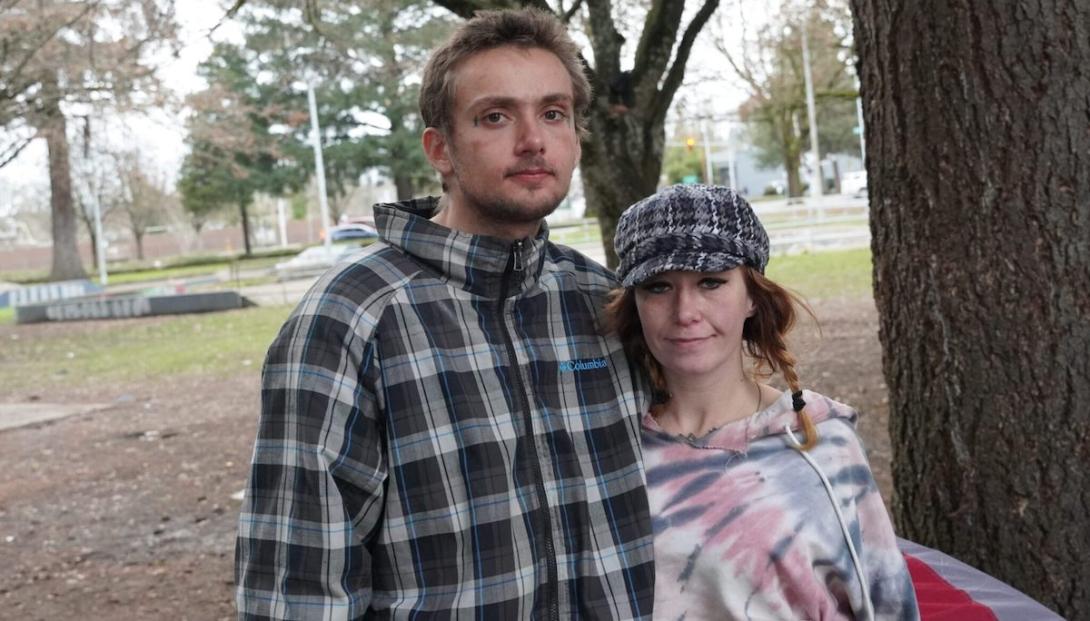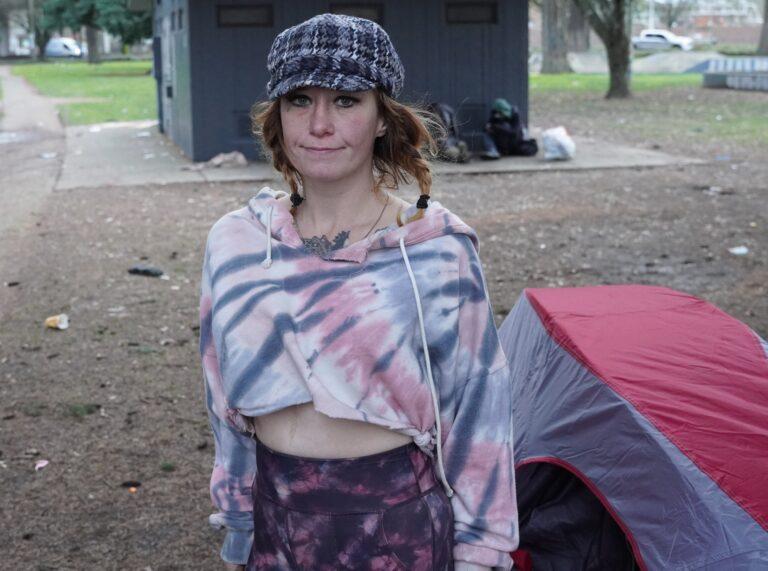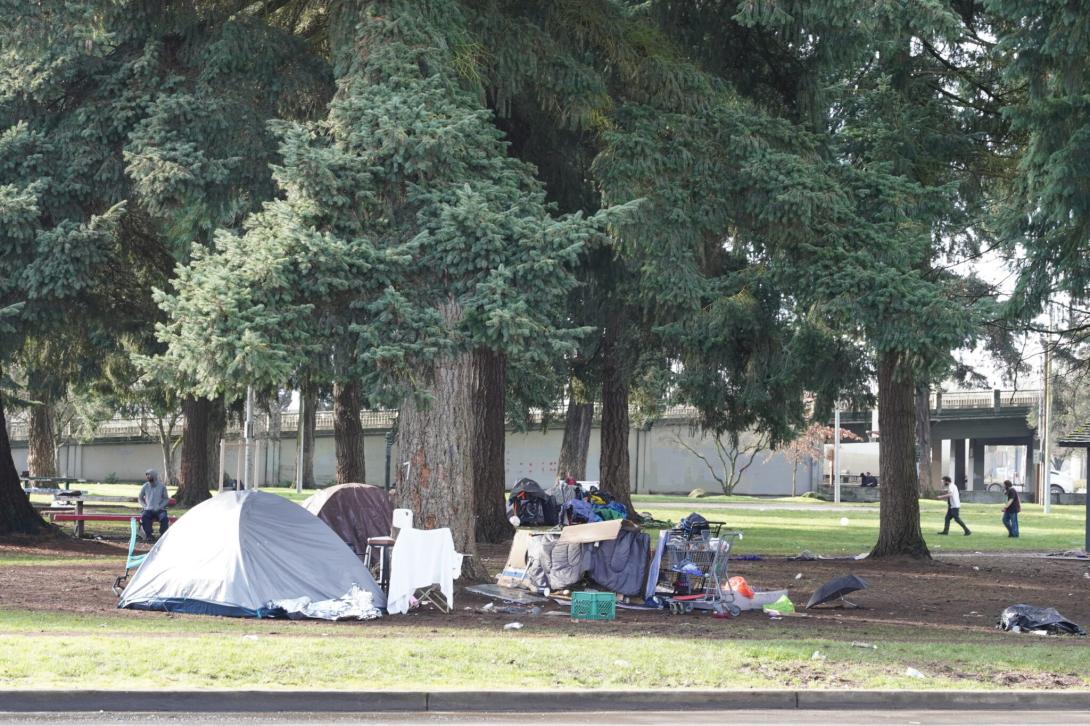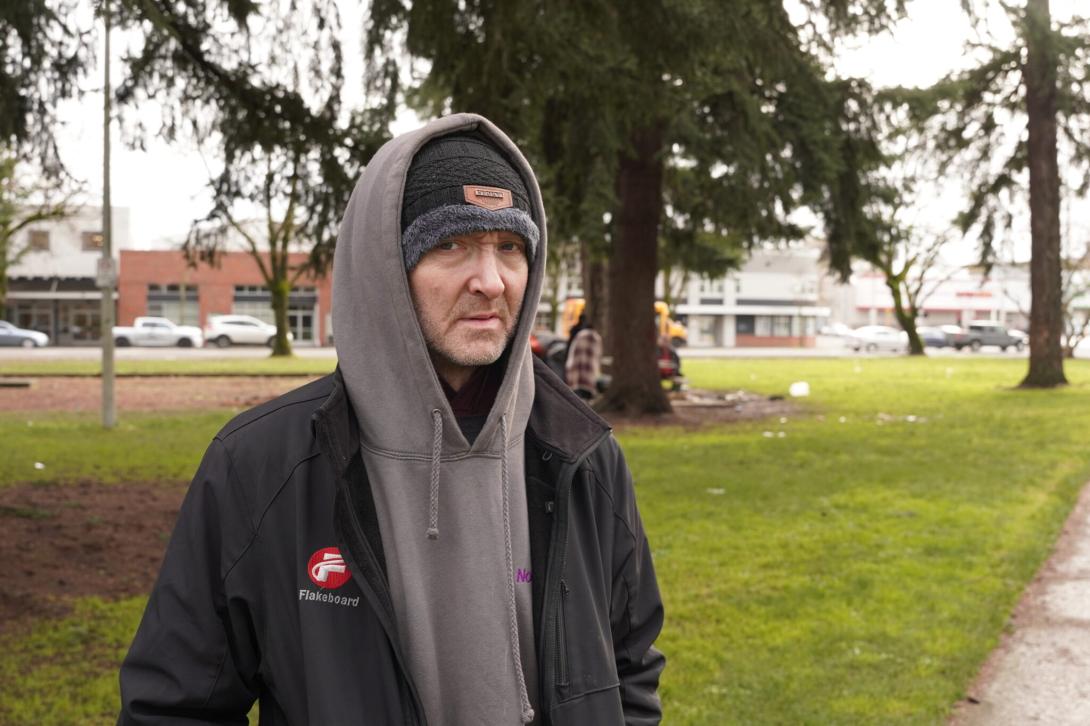
At Marion Square Park in Salem, tents pop up at dusk in the shadow of the capital city’s downtown.
Public drug use is the norm. Under the shade of trees, users light up pipes to smoke drugs, with no concern about hiding it as teenagers nearby shoot hoops in a basketball court.
Others sit around a picnic table, eating snacks, talking and keeping a close eye on their possessions. Now and then, a Salem police officer strolls through to chat with people and ask how they are doing.
Many have seen others overdose on fentanyl, sometimes fatally. Some of them have experienced an overdose themself. Others turn to other drugs for fleeting comfort and highs, fearful they will become another casualty of Oregon’s fentanyl epidemic, which is behind a surge of opioid overdoses in recent years, killing about 3,070 people since 2019.
Many of the dozens of people living on or near the 2.6-acre Salem parcel have a story of how they reached this point: a vice that spiraled out of control, a crisis that put them down the wrong path and, often, years of addiction. For many, their journey started well before Oregon voters passed Measure 110 in 2020, which decriminalized possession of small amounts of drugs and put a share of cannabis revenue toward addiction services and programs.
Marion Square Park, with its open drug use and homelessness, is a microcosm of the problems that Oregon lawmakers plan to address when they gather just one mile away in the state Capitol on Feb. 5 to start the 35-day legislative session.
Already, Democratic lawmakers have released their framework of a sweeping proposal that would unwind the decriminalization of drug possession, allowing police to arrest and charge people with a low-level misdemeanor that carries up to 30 days in jail, a fine or both. The catch: people could avoid the charge if they entered a treatment program. The complex proposal has other parts, like increasing opioid treatment medication in jails, expanding clinics and setting up more housing to help people in recovery.
A range of people are skeptical about the proposal or outright oppose it: Republican lawmakers say it doesn’t go far enough. And advocates, addiction treatment providers and Measure 110 supporters say it would mark a return to the failed war on drugs that incarcerated people of color disproportionately in the 1980s and 1990s.
Also among the skeptics: people who live on the streets and deal with addiction every day. Many have seen the system fail them for years in one way or another, been in and out of jail and bounced from one shelter to another to stay warm in treacherous weather like the ice storm earlier this month.
Whatever the Legislature decides, this much is clear: The homeless and people addicted to drugs who sleep in Marion Square Park and elsewhere in Oregon will continue to face challenges after the session ends.
Plans for a better life
Alicia Jacobs, 38, pitched a tent in Marion Square Park with her fiancé, Devin Hall, 25, on Thursday evening.
Hall has overdosed once. Jacobs said she has overdosed on fentanyl 10 times, including once on Christmas Eve.
Last Thursday night, Jacobs had plans to visit a clinic and get medication to treat an opioid addiction after relapsing and getting back on fentanyl. She encouraged Hall to visit the clinic with her.
“It’s progress, not perfection,” Jacobs said of her journey.

Both see potential downsides and good parts in the Democratic proposal. For example, Jacob said she wishes she had more access to treatment when she was in a jail in Washington state for driving under the influence. After that experience, she landed in a “traphouse,” a spot where people live and use drugs – and became hooked on methamphetamines after never using them in her life.
“I was released and had nothing,” she said.
Before that, she said she had a good job as a logistics worker at a warehouse.
They said that forcing someone to choose treatment over jail is not a good plan: Recovery has to be a choice someone makes – not something they’re forced into doing.
“I think the option should be if you don’t want to get clean and sober – a fine,” Hall said. “But not jail unless it’s over a certain amount.”
Under Measure 110, those caught with small amounts of drugs are issued a $100 citation or the choice to call for help, but most people ignore both.
The couple is looking towards a future in recovery, fueled by their experiences with drugs. Jacobs plans to take courses through Longview Community College with the goal of becoming a drug and alcohol counselor.
She wants to help others while she can: She was recently diagnosed with cancer in her lymph nodes and needs more tests and a bone biopsy to make sure it’s not spread further.
The two don’t have a wedding date set but they see that in the future after they turn their lives around.

Varied opinions on the streets
Sara Blades, 47, has been homeless off and on for 10 years in the Salem area. She uses methamphetamine and said she’s trying to get into a treatment program.
Blades said she fell into addiction, which started with alcohol, after she was sexually assaulted in 2016. Sitting on a street corner, she said she supports the idea of people in addiction getting the choice to enter treatment to avoid getting charged.
“That I would support,” Blades said. “It’s just not cool to use anymore.”
Another person on the streets, Jason, 42, said he uses methamphetamines but avoids fentanyl. At night, he sleeps on the streets, carefully picking locations with security cameras in case he is assaulted.
Jason, who declined to give his last name, said police should only arrest people with an addiction if they commit another crime, such as stealing property or hurting another person. That approach, he said, would be similar to how the authorities treat people with an alcohol addiction.
Some days, he has drugs. Other days he doesn’t.
“If I don’t get them, I just go to bed,” he said.

‘Why I’m still here, I don’t know’
Chad, a 52-year-old former arborist, tried marijuana for the first time when he was 13, and at 17, he turned to meth. In recent years, he turned to fentanyl as heroin became harder to find.
A few weeks ago, he burned his arm with a methamphetamine pipe. An infected blister marred his arm just above his wrist. Chad, who declined to give his last name, went to a hospital emergency room for antibiotics, but he said he may need another round of medication.
When the ice storm walloped western Oregon earlier this month, he stayed at a shelter to escape the frigid temperatures. Like others on the streets focused on survival, he’s not heard much about the Democratic proposal. But he’s skeptical that it would push Oregon in the right direction.
“It probably can’t help much,” he said. “It will probably just jam up the system more.”
Yet he also supports parts of the proposal. For instance, he said, the state needs to spread fentanyl awareness, especially among young people. He’s seen the drug’s deadly impacts up close. Chad lost a girlfriend in 2022 to a fatal fentanyl overdose in Eugene.
“Why I’m still here, I don’t know,” he said.
For a while, he said, he had four cans of Narcan, which reverses overdoses. But someone stole his possessions, including the nasal spray.
He’s looking for a way to improve his situation and, he said, the decision is up to him.
“I keep waiting for something to change,” he said. “Nothing’s going to change unless I change it.”